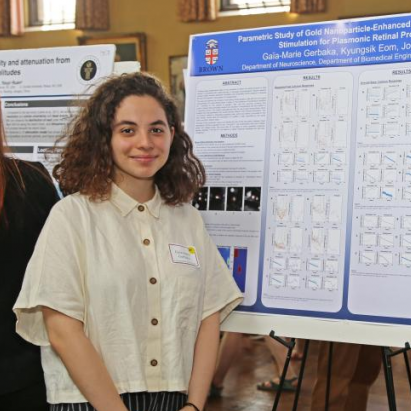Project Title: Gold Nanoparticle-Enhanced Near-Infrared Neural Stimulation for Photonic Retinal Prosthesis (Advisor: Jonghwan Lee; School of Engineering)
What is your major/concentration?
Biomedical Engineering and Neuroscience
What year will you graduate?
2021
Where are you from?
Beirut, Lebanon
What were your academic interests in high school?
I was particularly interested in Physics, Biology, and Mathematics with a strong emphasis on subjects such as Neuroscience, Electricity, and Mathematic Modeling.
What is your favorite activity outside of the classroom?
In my spare time, I love teaching young Syrian refugees as a BRYTE tutor.
Why did you decide to pursue research in brain science?
I am particularly interested in the combination of Engineering and Neuroscience on a cellular scale and my particular project relies on both fields heavily.
Can you tell us a little about your project and what you found?
The end goal of my project is to treat people with retinitis pigmentosa, which characterizes itself by a gradual loss of sight in affected patients. My particular work consists of optimizing the results of the in vitro part of the experiment which is conducted on isolated mouse retinas. The results prove the possibility of stimulating retinal ganglion cells, and thus optic nerves, by shining a near-infrared laser on the treated cells. And hence, the possibility of using ganglion cells instead of photoreceptors to restore vision.
What is your most memorable experience from your training in brain science?
The most rewarding part of the experiment is being able to see the live cells respond to the stimulation under fluorescent light.
What have you learned from this experience that you are applying to other aspects of your Brown degree?
The consistency and complexity of the experiments have truly taught me the fundamentals of experimental research. From mouse dissections to data analysis the experiments rely on different technically challenging technologies and procedures which have allowed me to learn multiple techniques and further my understanding of subjects such as Neural Anatomy, Genetics, Biochemistry, Electrical Engineering, and Data Processing.
What would you like to do after graduating?
After graduating I would like to pursue an MD/PhD in Biomedical Engineering with an emphasis on Neuroengineering research.
